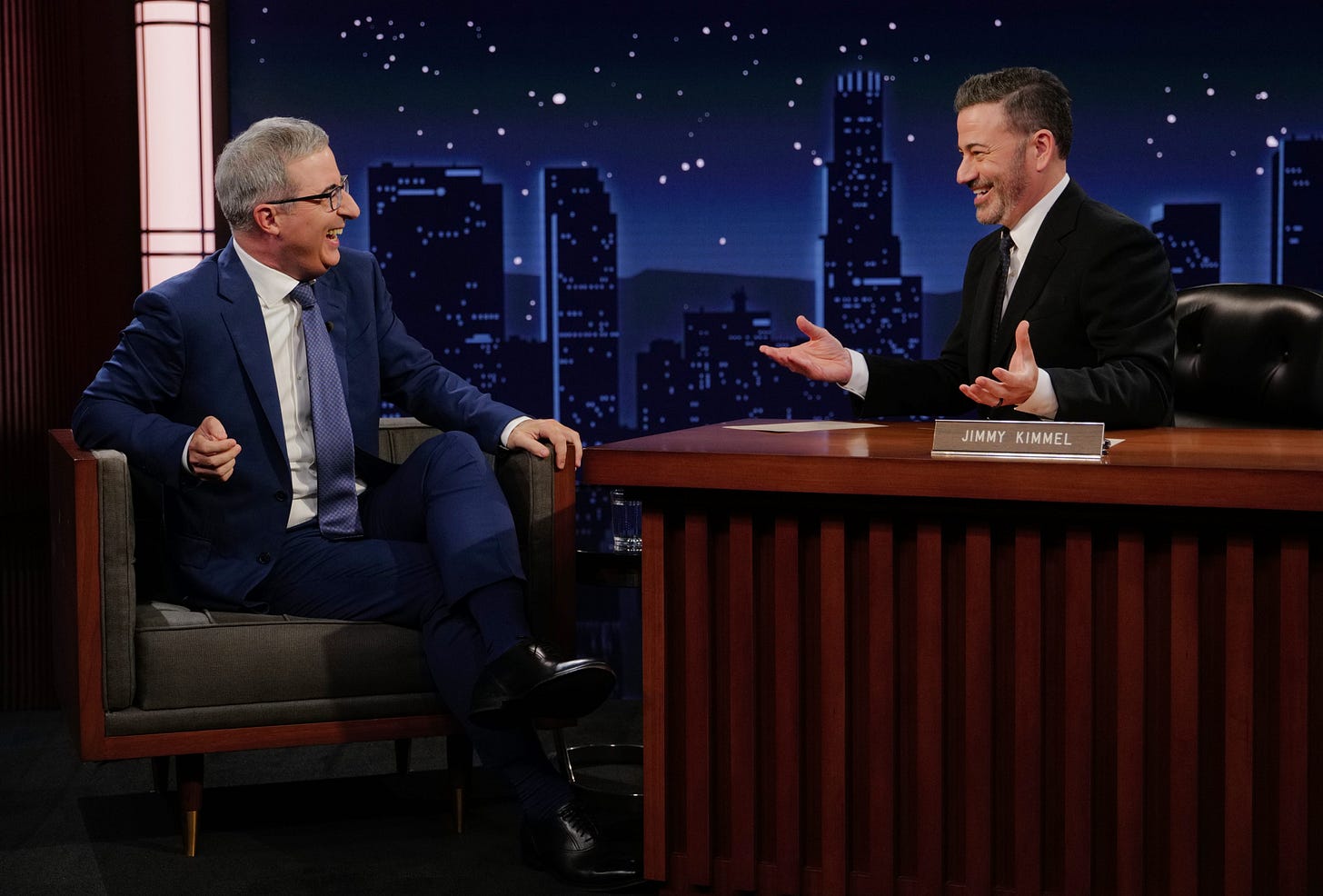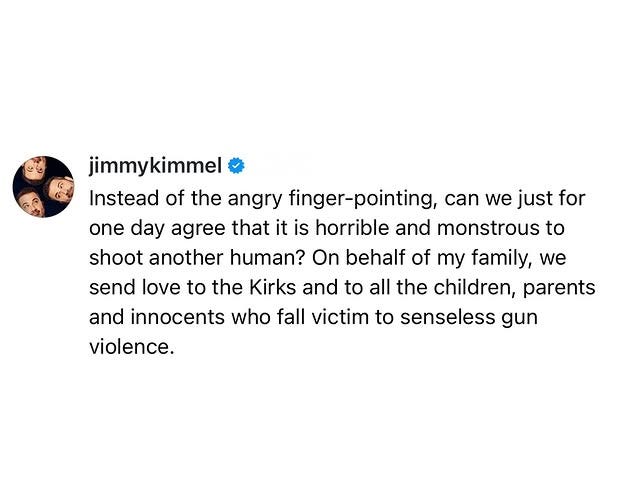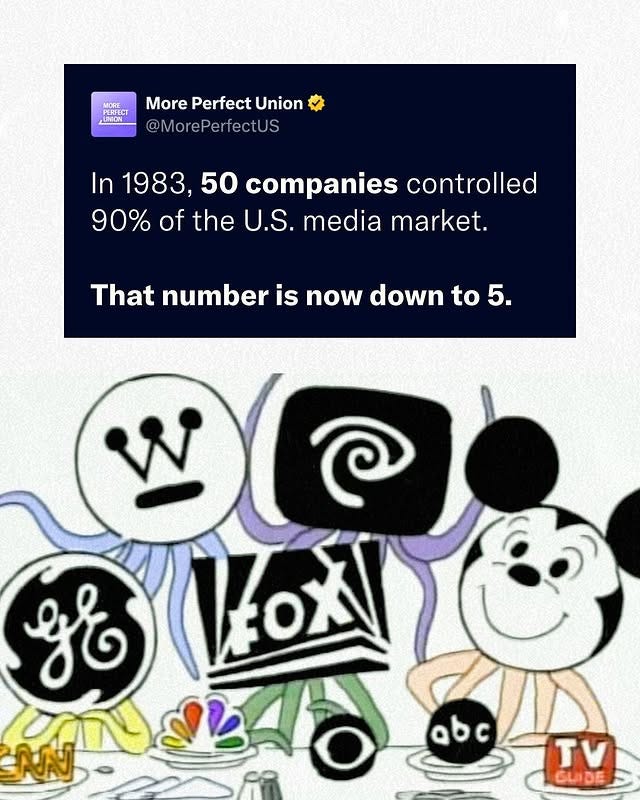Understanding the Quiet Part(s) Behind Jimmy Kimmel's Suspension
A tangled web of media consolidation, authoritarian encroachment and online nihilsm.
I’m trying out a new recurring format to help explicate the critical layers of context behind news stories. Please let me know what you think!

The Loud Part
A good headline, as all professional journalists know and strive for, succinctly delivers as many of the 5Ws and H as necessary and possible in order to provide readers the gist of the news story at a glance. Every major and legitimate news outlet, of course, correctly captured the most important part of this story, the “what” — Jimmy Kimmel Live! being pulled off-air “indefinitely” — and all of them except USA Today1, which used the passive voice, also noted the “who” — that it was ABC or its parent company, Disney, doing the yanking.
However, they all missed the mark on characterizing the “why” (emphasis mine). These are examples of accuracy without precision:
“ABC suspends Jimmy Kimmel’s late-night show indefinitely over his remarks about Charlie Kirk’s death,” Associated Press
“Disney’s ABC yanks ‘Jimmy Kimmel Live’ off air after remarks about Kirk,” Reuters
“ABC Pulls Jimmy Kimmel Off Air for Charlie Kirk Comments After F.C.C. Pressure,” The New York Times
“ABC Pulls ‘Jimmy Kimmel Live!’ After Charlie Kirk Comments,” Variety
“Jimmy Kimmel Pulled ‘Indefinitely’ by ABC After Charlie Kirk Comments,” Deadline
“ABC Suspends ‘Jimmy Kimmel Live!’ ‘Indefinitely’ Over Charlie Kirk Shooting Comments,” The Hollywood Reporter
“Disney Pulls Jimmy Kimmel’s Show After Kirk Remarks,” The Wall Street Journal
Without reading further, it would be easy to assume that Kimmel mocked or said something else insensitive about the right-wing media personality, who was killed a week ago in a targeted shooting while making a public speaking appearance at Utah Valley University. On the contrary, Kimmel’s immediate response to the murder was to denounce the violence and express condolences to Kirk’s family, writing on social media, “On behalf of my family, we send love to the Kirks and to all the children, parents and innocents who fall victim to senseless gun violence.”
I’m not trying to take potshots at my staffed peers; I know the pressure of getting breaking news out as soon as possible so that you can beat a rival outlet to readers’ inboxes by even a matter of seconds. But I wish any of these headlines had included the crucial specificity that Variety had in its earlier coverage of the developing story: “FCC Chairman Threatens ABC Over Jimmy Kimmel’s Remark About Charlie Kirk’s Killer.”
The Quiet Silenced Part
These are Kimmel’s infamous “Charlie Kirk comments,” which came just after the two-minute mark during the host’s opening monologue on Monday night:
“We hit some new lows over the weekend, with the MAGA gang desperately trying to characterize this kid who murdered Charlie Kirk as anything other than one of them, and doing everything they can to score political points from it.”
Kimmel then segued to his main subject, making fun of Donald Trump for his response to Kirk’s death. (You can’t even call it performative grief, because he’s barely performing — see the clip above, at the 2:20 mark.) But the part that right-wing media took such umbrage to was the accusation that they were politicizing Kirk’s death, and the suggestion that his killer could have come from their end of the political spectrum.
Kimmel’s wording is actually very careful — I assume that ABC’s legal department, especially under a U.S. president with a history of suing media companies for defamation (including ABC itself, which paid a $15 million settlement to Trump last year), scrutinizes and has to clear every scripted remark that makes it on air. He never directly asserts anything about the killer’s political affiliation. He just says that Team MAGA is insistent that he isn’t one of their own.
But just as a hit dog will holler, right-wing media seized on that one sentence and fanned the flames. On Wednesday, a far-right podcaster spent the first eight minutes — nearly a third — of his show railing against Kimmel’s comment and twisting its meaning, accusing the talk-show host of victim-blaming Kirk for his own death. “Here’s Jimmy Kimmel saying it’s actually the right that killed Charlie Kirk,” he said. “And what that is, is saying that Charlie Kirk deserved it and that Charlie Kirk actually created the conditions, he’s to blame for his own assassination.”
The podcaster also distorted how broadcast media works. “The ABC News platform… is taxpayer-funded with luxurious and lavish gifts from the federal government,” he claimed. (No, that would be public media, which thanks to the Recissions Act of 2025 has been defunded.) He declared that ABC was in violation of its “broadcast charter” for not upholding the standard of operating “in the public interest,” and invoked section 312 of the 47 U.S. Code in calling for sanctions against the company, before bringing on Federal Communications Commission chair Brendan Carr to make those threats himself.
“When you look at the conduct that has taken place by Jimmy Kimmel, it appears to be some of the sickest conduct possible,” declared Carr, with some hyperbole. “We can do this the easy way or the hard way. These companies can find ways to change conduct and take action on Kimmel, or there’s going to be additional work for the FCC ahead.”
Carr did correct the podcaster that the FCC regulates licensed stations (i.e. your local channel 7), not national networks like ABC that create the programming that the stations carry. “There’s actions we can take on licensed broadcasters,” he explained. “It’s past time that a lot of these licensed broadcasters themselves push back on Comcast and Disney and say, ‘We are going to pre-empt. We are not going to run Kimmel anymore until you straighten this out, because we, the licensed broadcaster, are running the possibility of fines or license revocations from the FCC if we continue to run content that ends up being a pattern of news distortion.’”
Within hours, that’s exactly what Nexstar Media Group, which operates the largest number of stations in the United States, did — with ABC itself pre-emptively pre-empting Jimmy Kimmel Live! shortly thereafter.
The Quiet Part
The fear of penalty wasn’t the only potential factor in Nexstar’s decision to drop JKL from its ABC affiliates. Nexstar is also awaiting FCC approval on its acquisition of rival station group Tegna, a deal worth $6.2 billion. According to current FCC rules, no single television station group can own more than 39 percent of U.S. household reach. The Tegna merger would give Nexstar (which a pre-Carr FCC already fined $1.2 million last year for violating that rule, with a different transaction) a whopping 80 percent U.S. household reach.
Carr has openly signaled a willingness to lift the cap, announcing a “massive deregulation initiative” in March: “The FCC is committed to ending all of the rules and regulations that are no longer necessary.” The phrase “no longer necessary” is vague in the same way a mob boss casually insinuates threats and invites bribes: “Nice bar you have here. It’d be a shame if something happened to it.” And this particular comparison of Carr to a mafioso isn’t mine; it’s from Ted Cruz.
Nexstar has issued the obligatory denial that its pre-emption of Jimmy Kimmel Live! was influenced by the FCC. It’s reminiscent of CBS parent company Paramount’s denial in July that its cancellation of The Late Show with Stephen Colbert had anything to do with its then-pending $8 billion merger with Skydance. In both cases, the late-night shows got the hook after their hosts said something critical on-air of the current political regime. Colbert’s show was cancelled days after he called Paramount’s $16 million settlement with Trump “a big fat bribe”; the company responded that its decision to end Late Show after this season was made “for purely financial reasons.” A week after the news of Colbert’s cancellation, the FCC approved the Paramount-Skydance merger, with Carr praising new owner Skydance’s commitments to “root out the bias that has undermined trust in the national news media.” These commitments include installing Kenneth Weinstein, a conservative policy veteran with no journalism experience, as ombudsman of CBS News and, likely, hiring conservative columnist Bari Weiss in a senior editorial role.
Disney also is at the mercy of the federal government concerning a pending merger of its own — that of the sports streamer Fubo. The U.S. Department of Justice is currently reviewing the deal for potential antitrust issues.
The Quieter Part
This is the current landscape of media ownership in the United States, via the nonprofit newsroom More Perfect Union:
Why does corporate consolidation matter? Three reasons:
The impact on consumers
Basic American civics teaches us that monopolies hurt consumers by driving out competition that keeps prices low. In the media world, even when that effect is indirect — station mega-owners like Nexstar or massive network groups like Disney having the muscle to charge higher carriage fees to cable or satellite providers — those costs ultimately get passed down to the individual customers via how much they have to pay for their TV packages like cable subscriptions, or even how much they pay for consumer goods, if a media company commands enough of the market to inflate ad rates.
The impact on workers
According to a survey of Nexstar staff conducted by the National Association of Broadcast Employees & Technicians earlier this year, the company pays on average 22% less than the median wage compared to its industry peers. Most respondents earn less than what is considered the living wage for their metro area, with 89% earning less than what’s considered a living wage for a single parent with one child.
As someone who has worked in a niche industry (entertainment trade journalism) experiencing its own antitrust concerns, I can attest that when one entity owns nearly all of the jobs, there is not only little incentive for the employer to keep salaries competitive, there are also scarce options for employment outside of its purview.
The impact on content
In the media world, monopolies not only have a dampening effect on innovation and quality, they also pose a direct threat to freedom of speech, as we are seeing now. This is why even some right-wing figures and entities like Cruz and Newsmax oppose media deregulation (they believe that the left will turn the tables and weaponize consolidation against conservative voices if/when they regain power).
The reality is, although much of the talent and creatives within Hollywood can accurately be characterized as “liberal,” the owners of the conglomerates who employ them aren’t, as both Axios and Semafor note. And when it comes to media companies whose front-of-camera representatives aren’t part of this artist class, you can get content like this:
This viral video from 2018 is a compilation of news anchors from Sinclair Broadcast Group-owned stations across the U.S. reading from the same script warning their viewers about “fake news,” which in the context of 2018 and Sinclair’s well-known conservative bent was clearly to support Trump’s ongoing campaign to discredit legitimate news outlets that criticized him.
Sinclair is second only to Nexstar in terms of the most TV stations owned, with nearly 200 across the country. It also condemned Jimmy Kimmel Live! and is pre-empting the show but is going even further: In a press release issued on Wednesday, Sinclair announced that it is airing a Charlie Kirk memorial special in JKL’s timeslot this Friday and throughout the weekend, and specified that Kimmel should issue a direct apology to Kirk’s family as well as make personal donations to both them and Kirk’s conservative nonprofit, Turning Point USA.
The impact of TV station operators like Sinclair and Nexstar might seem obscure to cord-cutters and so-called “coastal elites” (guilty as charged), but the significance of local news should not be underestimated. The perception (or reality) of partisanship in national media has eroded public faith in those institutions, whereas a majority of Americans say they still trust their local outlets. This is a big problem if the owners of those outlets have a blatant agenda — and there are no accessible alternatives.
“Corporate consolidation is necessary for authoritarianism to flourish,” writes political commentator Matt Stoller, “and the heart of authoritarian politics lies in the corporate boardroom.”2
The Quietest Part
Most of the coverage of Jimmy Kimmel Live!’s suspension has been about government censorship and corporate complicity. Less considered has been the question, What was Jimmy talking about anyway — insinuating that Kirk’s killer came from the right?
Disinformation about the identity and beliefs of Kirk’s alleged killer began spreading before he was even identified. (I recommend PolitiFact’s post for the most reliable information.) Facts that at present are not being disputed include that his family is Mormon and his upbringing was generally conservative but not actively political. Four shell casings recovered at the scene were inscribed with phrases that included "Hey fascist! Catch!"
Other than the above, the rest should be taken with a grain of salt. Accounts from law enforcement and political leaders should be subject to the same level of journalistic scrutiny as any other source, and not automatically regarded as gospel truth. Keeping that in mind, according to the indictment, the suspect’s mother told police that he had become “more political” in recent years, specifically “more pro-gay and trans rights-oriented,” and that he had accused Kirk of “spreading hate” in the days leading up to the shooting.
The indictment also includes a transcript of a text conversation that police claim to have received from the suspect’s roommate, in which he essentially confesses to killing Kirk because “I had enough of his hatred.” Elsewhere in the document, the suspect’s mother told police that the roommate is a transgender woman who was dating her son. Snopes notes that this is all secondhand information, and the roommate has not come forward.
Taken together, the secondhand accounts of the suspect’s political and personal affiliations and the literal interpretations of the casing engravings suggest that Kirk was killed by an antifascist3 activist who sympathized with transgender rights and people. An opposite theory, that the suspect is actually an acolyte of Nick Fuentes’ far-far-right group Groypers (who despised Kirk as too moderate for their tastes), has just as much — or as little — basis but is perhaps what Kimmel was alluding to in his Monday monologue.
Going back to what has not been contested about Kirk’s shooter is that he was chronically online, and even the boomer authorities acknowledged that the shell casing engravings were meme references, mostly rooted in gamer culture. Esoteric by design, they raise the additional possibility that the alleged killer is less the product of online radicalization than online nihilism. “This assassination was a shitpost,” says Internet culture scholar Aidan Walker. “It was designed to be maximally disruptive and incomprehensible, cloaked in layer upon layer of irony.”
If the “Joker explanation” is true (and we may never know the true motives behind Kirk’s murder), there are three points of action we can and should take in response:
Hire more experts in journalism and law enforcement who are adept in and ideally native to navigating the dark recesses of the Web. I especially appreciated these articles in The Independent and The Guardian for helping explain this particular angle in lay terms, and with nuance and non-partisanship. On the law enforcement side, I would not be surprised if several qualified investigators who would have been key to this particular investigation were swept up in the Kash Patel-led FBI’s purge, including the former head of the Salt Lake City office.
Regulate tech platforms. This argument can be made much more compellingly and in more detail by people with more expertise in this sector than I have, but how many more tragic examples do we need of the dangers of allowing social media and other tech companies to run rampant through culture, unchecked?
Touch grass. I don’t mean this flippantly but rather, like Utah governor Spencer Cox, genuinely. For all the good that mass media can do to promote connection, we cannot allow ourselves to become divorced from the fabric of reality and real-life consequences. “Social media is a cancer on our society right now,” he said during a Sept. 12 press conference providing updates on the Kirk case. “I would encourage people to log off, turn off, touch grass, hug a family member, go out and do good in your community.”
Half a point to USA Today and The New York Times’ headlines for noting the FCC’s fingers in the pie.
Stoller’s Substack newsletter, Big, is all about the history and politics of monopoly power, and his post about the Kimmel incident is a must-read. He advocates for a repeal of the Telecommunications Act of 1996, which was meant to lower the barrier of entry into the field by relaxing media ownership restrictions but in practice squashed smaller competitors and ushered in the era of mega-consolidation we live in today, and for the enactment of new legislation that would restore New Deal-era regulations to media as well as apply them, finally, to the tech sectors as well.
It remains remarkable to me that being against fascism is now anathema to the right.






I think this format is tremendously useful and made me and want to read more. The headings are great signposts for the level into the story and the "whys" and it made me want to learn more. I especially liked the action steps at the end!
It's quite succinct.